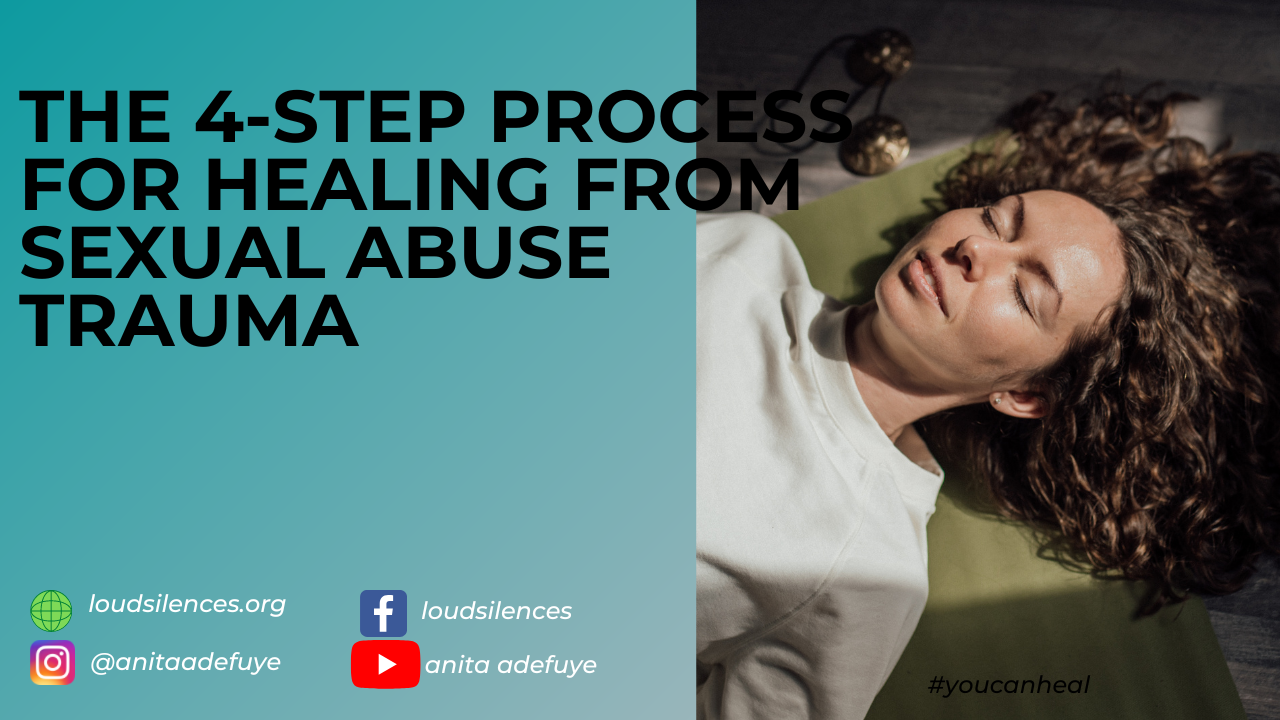Are you confused about how you can heal from the trauma of a sexual abuse experience? If I had to pick THE 4-step process for healing from sexual abuse trauma, from among many others, these would be IT.
Healing from sexual abuse and assault trauma can be painful and take a lot of time. But before if you want a full recovery from the experience, you need to make efforts to heal.
It can be hard, but here’s a 4-step guide you can follow to kickstart your healing process.
You don’t necessarily need to follow the steps in this order, but strive to be consistent.
THE 4-STEP HEALING PROCESS
1. ACKNOWLEDGE YOUR EMOTIONS
In most cases, sexual abuse triggers negative emotions. Some common emotions that survivors go through as a result of sexual abuse are;
- Guilt and shame
- Blame and anger
- Grieving
- Fear and anxiety
Although these emotions are common, it’s not always the same with every sexual abuse survivor.
The first hurdle you have to cross in your healing is to identify and acknowledge your emotions.
You need to identify how your sexual abuse experience has influenced your emotions and shaped your consciousness. Yes, sexual abuse trauma can leave you feeling like a victim. In fact, what people say and do around you can validate that view.
Choose to see yourself as a survivor who’s on a recovery journey, and strive hard to prevent the negative views of others from interfering with your healing.
2. SHARE WHAT HAPPENED TO YOU WITH SOMEONE YOU CAN TRUST
Opening up about your sexual abuse experience is an essential aspect of the healing process that you should not forgo.
Bottled-up trauma eventually escalates and leads to problems like post-traumatic stress disorder (PTSD), substance abuse & addiction, depression and many other mental issues.
It can be very hard to open up about an experience you consider shameful and painful. However, don’t forget that the healing would come faster when you get someone else to participate in your healing process.
Try speaking to a family member or a friend who you can trust.
Alternatively, you can talk to a counselor or therapist about your experience. The more knowledgeable and supportive your confidant is, the more likely you are to heal faster.
3. DEAL WITH YOUR EMOTIONS
A person who has experienced sexual abuse is bound to experience any number of negative emotions about themselves and others.
Feeling bad about yourself after sexual abuse is perfectly normal. But when you don’t nip these negative thoughts in the bud, they tend to get worse.
Sexual abuse trauma has the ability to wreck the self-esteem, self-awareness and sense of self-worth of a victim.
There have been cases where victims report feeling ‘dirty’ and having a constant urge to shower. In some other cases, victims feel guilty and blame themselves for the abuse. Thoughts and feelings like these can be hard to control.
Which is why it’s important to have a confidant who can give you support and clarity to deal with your emotions.
Also, you should build your own coping mechanisms.
Avoid situations that can trigger trauma, and open your heart and mind to positivity. And don’t spend too much time thinking, stay active with things you enjoy doing.
4. RECLAIM YOURSELF AND IMPROVE
Reclaiming yourself actually begins from DAY 1 of your healing process.
But it’s more like when you’re climbing a ladder, you need to get through the bottom rungs before you can reach the top rung.
You need to have acknowledged your emotions, received support from your confidant, and dealt with your emotions, before you can truly reclaim yourself.
Reclaiming yourself is not about living life like you never went through sexual abuse.
Rather, you’re conscious of the abuse. But regardless of it, you love yourself and live your best life.
It doesn’t just stop there. Reclaiming helps you reform yourself, to an extent. And this is a perfect opportunity to learn new things, move past certain problems and build your mental strength.
It can improve your life significantly, as long as you follow through all the steps. Of course, there are more tips, but settle with these for now.
TAKEAWAYS
It could take months, or even years before you can get to the point where sexual abuse trauma no longer haunts you.
For true healing, strive to be consistent and intentional about your healing. Stay in good communication with your confidant, and track your progress.
Always be at peace with yourself, and keep going. Your mental health is worth it. You are worth it!
Anita Adefuye, the author, shares her story of sexual abuse, low mental health, suicide, and how she overcame them all. Today, she is the founder of LoudSilences and more.
Her book, Reve-Healed – A true story of pain, healing, and hope, is available for purchase. Get yourself a copy today!

Leave a Reply